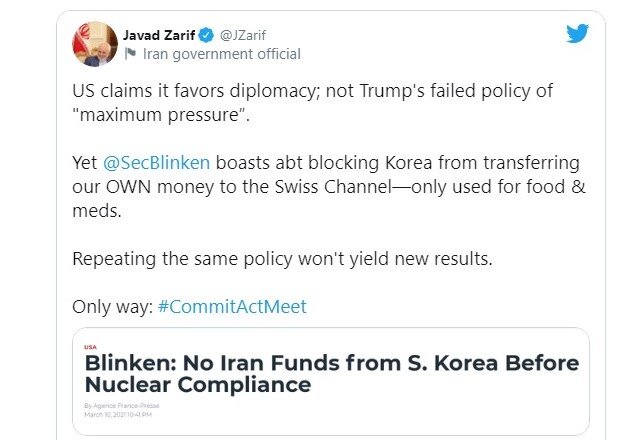Zarif to Blinken: Repeating failed ‘maximum pressure’ policy won’t yield new results

TEHRAN - In response to U.S. Secretary of State Antony Blinken who has said Washington will oppose the release of Iran’s frozen assets in South Korea until Tehran returns to full compliance to the 2015 nuclear deal from which the U.S. has officially withdrawn, Iranian Foreign Minister Mohammad Javad Zarif has advised the new Biden administration that the “same failed policy of maximum pressure” campaign exercised by the Trump administration will not produce new results.
“Repeating the same policy won't yield new results,” Zarif tweeted on Thursday.
Zarif said such remarks are incompatible with the statements by the Biden administration that claims it favors diplomacy.
“U.S. claims it favors diplomacy; not Trump’s failed policy of ‘maximum pressure’,” Zarif added in his tweet.
Asked about Iran’s frozen funds in South Korea at the House Foreign Affairs Committee on Wednesday, Blinken said, “If Iran comes back into compliance with its obligations under the nuclear agreement, we would do the same thing.”
However, Zarif said, despite Biden’s claims, his secretary of state still insists on pursuing the same futile policy with regard to Iran.
"Secretary Blinken boasts about blocking Korea from transferring our own money to the Swiss Channel—only used for food and medicine," Zarif regretted.
The U.S. is the only party that has left the nuclear deal – JCPOA – and naturally, it should be the first party to return to its commitments.
In retaliation to U.S. exit from the nuclear deal in May 2018, only one year later Iran started to gradually reduce its commitments to the JCPOA in accordance to the paragraph 36 of the JCPOA.
Iran has been insisting that as soon as the U.S. returns to its commitments in a verifiable and practical manner it will reverse its decisions and resume full compliance to the JCPOA.
In a phone call with his Finnish counterpart Pekka Haavisto on Wednesday, Zarif reiterated Tehran’s position saying, “If the U.S. lifts its illegal sanctions [against Iran] and implements its obligations as per the JCPOA, Iran will also reverse all its remedial steps.
Tehran has been pressing Seoul to unblock about $7 billion of its assets frozen in two South Korean banks. Seoul said last month that Iran’s money will be released only after consultations with the U.S. government.
No talks needed on U.S. return to JCPOA
In remarks on Thursday, Iranian Deputy Foreign Minister for Political Affairs Abbas Araqchi also said a possible return of the U.S. to the nuclear agreement does not require any negotiations since Washington held no consultations with anyone before its pullout from the multilateral deal.
“In our opinion, the U.S. return to the nuclear agreement does not require any meeting. Did the Americans hold talks with anyone when they withdrew from the agreement? Did they hold a meeting?...We believe that there is no need for negotiations or any meeting,” Araqchi told Sputnik.
Araqchi — who served as a senior negotiator during the talks in the run-up to the deal — said there is a “simple” solution to the current dispute over the agreement, and that is for the American side to return to the JCPOA and lift all the sanctions it has re-imposed on Tehran.
“After that Iran will once again abide by its obligations after verifying the U.S. credibility in this regard,” the senior diplomat added.
However, Araqchi said a meeting of the remaining signatories to nuclear deal – Iran, Russia, China, Britain, Germany, and France - is possible at any time.
“Over the previous years, the Joint Commission on the nuclear agreement have held a regular session every three months, and we also used to conduct unofficial emergency meetings. There is no issue to hold a meeting with the current members, or consult with them and exchange opinions,” the diplomat explained.
He emphasized that the U.S. can take part in these sessions only if it lifts sanctions on Iran.
Faud Izadi, a Tehran University professor, said two months have passed since Biden’s presidency but he is continuing the same old policy of the Trump administration.
Izadi told ISNA that the American should realize that time is not in their favor.
Intimidation against Iran won’t work
Hossein Amir-Abdollahian, the special aide to parliament speaker for international affairs, also said in a tweet on Friday that there will undoubtedly be no negotiations with the U.S. under pressure or intimidation.
“Biden should learn lesson from history. One should talk to the great and powerful Iranian nation with power of logic and not logic of blackmail,” Amir-Abdollahian remarked.
The former Foreign Ministry pitman for Arab affairs also said the sanctions on Iran are taking their “last breath”.
PA/PA
Leave a Comment